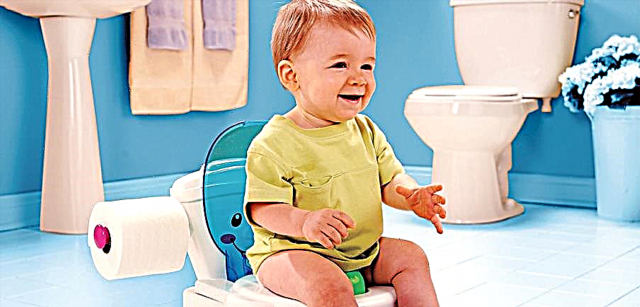
For bacterial infections in children, sulfa drugs can be prescribed, the most famous representative of which is called Biseptol. Especially for children, such a drug is produced in suspension. For what diseases does this medication help and in what dose is it given to children?

Release form
Suspension Biseptol is a creamy or white liquid that has a strawberry smell. One dark glass bottle contains 80 ml of this drug.
Composition
The active ingredient in Biseptol is co-trimoxazole. This name combines two active ingredients at once, because in this drug sulfamethoxazole is supplemented with trimetroprim, and the ratio of such substances is 5: 1.
100 ml of liquid form of Biseptol contains 4 g of sulfamethoxazole (this is 200 mg per 5 ml of suspension) and 0.8 g trimethoprim (a dose of 5 ml of the drug accounts for 40 mg of such a component). A dosage of 5 ml is considered for two substances at once, so it is 240 mg.
Among the auxiliary substances of Biseptol in the suspension are water, Na hydrogen phosphate, propyl and methyl parahydroxy benzoate, macrogol, Na carmellose, citric acid, propylene glycol and Mg aluminosilicate. The smell and sweet taste of the medicine are provided by the strawberry flavor, maltitol and Na saccharinate.

Operating principle
The main components of Biseptol have an antimicrobial effect, affecting the formation of proteins in bacterial cells. Due to their influence, protein synthesis in microbial cells is disrupted, which leads to their death. This effect is called bactericidal.
The drug is effective against:
- Escherichia coli.
- Hemophilus sticks.
- The bacteria Haemophilus parainfluenzae.
- Moraxell catarlis.
- Shigell.
- Citrobacter.
- Klebsiell.
- Hafnium.
- Serration.
- Yersinius.
- Proteus.
- Enterobacter.
- Vibrio cholerae.
- Edwardsiell.
- Alcaligenes faecalis bacteria.
- Burkholderiy.
Pneumocysts, listeria, cyclospores, brucella, staphylococcus, pneumococcus, providence, salmonella and some other bacteria are also sensitive to Biseptol.
Mycoplasma, pseudomonas, treponema pallidum and tubercle bacillus are resistant to the drug. Biseptol does not work on viruses, therefore such a medication is not prescribed for ARVI, as Dr. Komarovsky says. Microorganisms, which Biseptol usually acts on, are also insensitive to the drug, therefore, it is always recommended to start treatment after a sensitivity test.
Indications
Biseptol is usually prescribed:
- With ENT infections - otitis media, sore throat, pharyngitis, laryngitis and others.
- With bacterial infection of the respiratory tract, for example, with pneumonia or bronchitis. The tool can also be used to prevent infection of the lungs with pneumocysts.
- With cystitis and other infections of the excretory system.
- For travelers' diarrhea, shigellosis, cholera, typhoid fever and some other gastrointestinal infections.
- With brucellosis, toxoplasmosis, osteomyelitis, acticomycosis and some other infections.

You may be interested in watching the release of E. Komarovsky's program, which details infectious diseases of the urinary tract in children:
From what age is it allowed to take?
The use of Biseptol under the age of 1 year is possible. Such a drug in the form of a suspension is prescribed for children over 2 months old. If the mother is diagnosed with HIV infection, the use of the drug in an infant is acceptable after 6 weeks of age. From the age of 3, treatment is allowed not only in the liquid form, but also with tablets, but most often they are given to children over 6-7 years old, when the child can safely swallow this solid form.
Contraindications
Biseptol should not be given:
- With intolerance to such a drug and any of its components.
- With renal failure.
- With a pronounced violation of the liver.
- With a lack of glucose 6 phosphate dehydrogenase.
- With leukopenia and agranulocytosis.
- With B12-deficiency or aplastic anemia.
If a small patient has bronchial asthma, porphyria, allergic diseases, problems with the thyroid gland or vitamin B9 deficiency, Biseptol is used very carefully.
Side effects
- There is an allergy to Biseptol, which is manifested by urticaria, erythema, itching, fever, skin rash, toxic necrolysis, serum sickness, angioedema and other pathologies.
- The drug can cause headaches, nervousness, apathy and dizziness. Occasionally, it leads to inflammation of the peripheral nerves, depression, meningitis, seizures, and hallucinations.
- A child's digestive tract may react to Biseptol decreased appetite, nausea, abdominal pain, stomatitis, increased activity of liver enzymes, diarrhea, cholestasis. Some patients develop colitis, pancreatitis, gastritis, or hepatitis.
- When treating with Biseptol, cough and shortness of breath may appear as signs of allergic alveolitis... The drug also causes infiltrates in the lung tissue.
- Biseptol can adversely affect blood formation, provoking a decrease in leukocytes, neutropenia, anemia, eosinophilia, thrombocytopenia and other changes.
- Side effects of the medication on the urinary system there is a violation of the kidneys or the development of nephritis.
- The drug can cause myalgia and arthralgia.

Instructions for use and dosage
The suspension is offered to children after meals and washed down with a sufficient volume of water. A single dose is determined by age:
The duration of therapy with Biseptol depends on the pathology. For example, with shigellosis, the medicine is given for 5 days, with cystitis - from 10 to 14 days, with bronchitis - 2 weeks, and with typhoid fever, the course of treatment can be several months. As a rule, the remedy is not given less than five days, and from the moment when the symptoms of the disease disappear, the therapy continues for another 2 days.
The drug is given twice with an interval of 12 hours. If the infection is severe, the doctor may increase the dosage by 50%.

Overdose
A too high dose of the suspension provokes nausea, headache, intestinal colic, an attack of vomiting, drowsiness, fever, fainting, dizziness, hematuria, depression. If an overdose of Biseptol is prolonged, it leads to jaundice, megaloblastic anemia, as well as a decrease in the level of platelets and leukocytes.

Interaction with other drugs and food
- Biseptol has the property of increasing the effect of treatment with indirect anticoagulants, methotrexate and hypoglycemic agents.
- When combined with Phenytoin, its therapeutic effect and toxicity increases.
- Prescribing Biseptol and diuretics increases the risk of a decrease in platelet count.
- Biseptol reduces the effectiveness of some antidepressants.
- The drug should not be combined with drugs that have a marked inhibitory effect on hematopoiesis, as well as with Naproxen and Aspirin.
- In the diet of a child, during treatment with Biseptol, it is advised to limit meals from cabbage, beans, carrots, tomatoes and peas, as well as fatty cheeses and other animal products.
- Before taking the drug, you should not eat dried fruits and beetroot dishes, as well as baked goods, since such products are very quickly digested.
- The action of Biseptol is partially neutralized with milk, therefore, you cannot drink the medication with such a product.

Terms of sale
Biseptol suspension can be purchased at the pharmacy with a prescription. The average price of one bottle is 120-130 rubles.
Storage conditions
In order for Biseptol to retain its properties during the entire shelf life of 3 years, it must be stored at temperatures below 25 degrees Celsius. The storage place should be inaccessible to babies, dry and not lit.
Reviews
Doctors treat Biseptol differently. Some pediatricians often prescribe it for bacterial infections to children of different ages, others believe that in our time, many microbes have lost their sensitivity to such a drug, therefore they prefer to prescribe modern antibiotics for angina or cystitis. Most often, the drug is prescribed if the pathogen has a sensitivity to co-trimoxazole.
In the reviews of parents, you can see both the positive effect of treatment with Biseptol for otitis media, bronchitis and other diseases, and complaints of side effects, among which nausea, poor appetite and allergies are most common. Also, in some cases, the drug does not have the desired effect, so it has to be changed to another antibacterial drug.


Analogs
You can replace Biseptol in suspension for children with other drugs that have the same active ingredients:
- Suspension Bactrim.
- Suspension Co-trimoxazole.
Also, instead of Biseptol syrup, the doctor may prescribe other sulfonamides, but these drugs are produced mainly in tablet form, therefore they are used in children aged 2-3 years and older.


Depending on the reason, antibiotics can also become a substitute for Biseptol, for example, for bronchitis, a pediatrician may prescribe Amoxicillin, Panklav or Sumamed. At the same time, it is impossible to independently replace Biseptol with such drugs, since only a specialist can choose the right analogue taking into account all factors.



